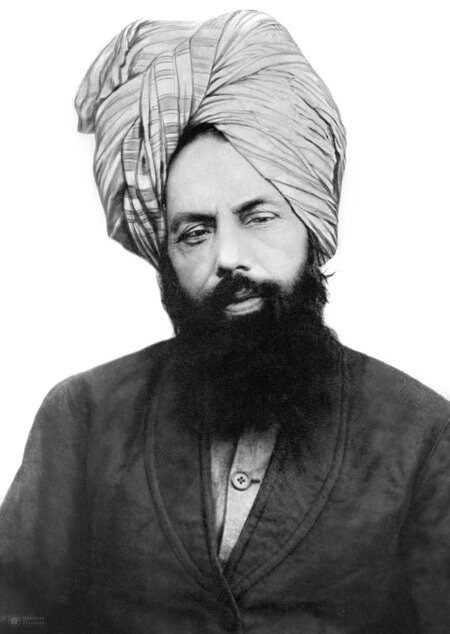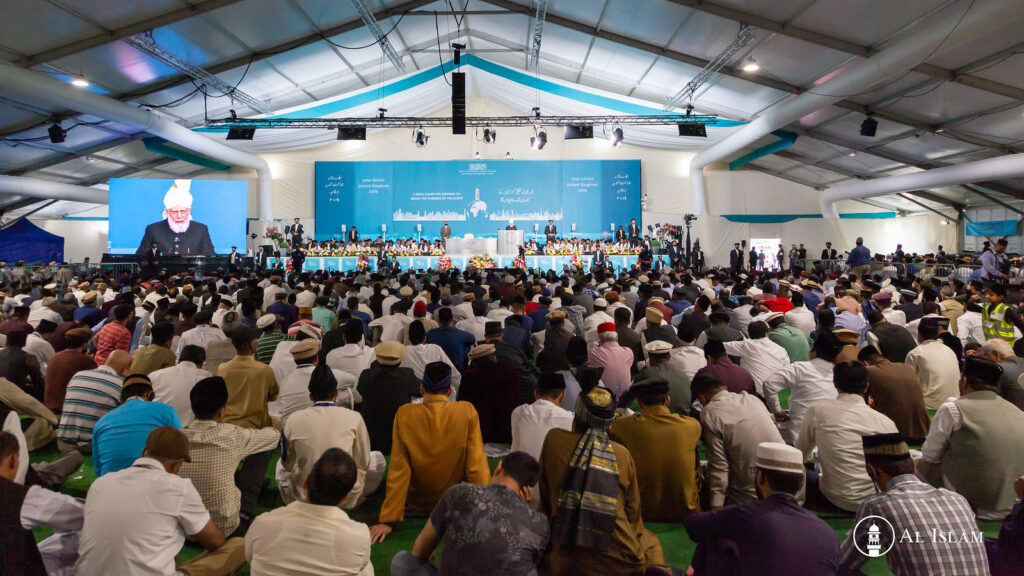Ataul Fatir Tahir, Al Hakam

In an ill-faithed attempt to attack Khilafat-e-Ahmadiyyat – triggered by the Google result of who the current caliph of Islam is – the host of the widely viewed “Smile2Jannah” YouTube channel released a “halal comedy” video.
The host of the channel is a British Muslim and his audience is also primarily Western Muslim youth. The video showcased the deep-rooted and rotten influence the ulema and clerics can have on Muslim youth living in the West.
Mockery, derision, misquotation, misrepresentation, cherry-picking and recycled allegations were the basis of the video; no fundamental Islamic akhlaq or etiquette preached by the Holy Prophet Muhammadsa could be observed in the video.
The “halal comedy” in the video instantly brings the following words of Allah to mind:
یٰحَسۡرَۃً عَلَی الۡعِبَادِ ۚؑ مَا یَاۡتِیۡہِمۡ مِّنۡ رَّسُوۡلٍ اِلَّا کَانُوۡا بِہٖ یَسۡتَہۡزِءُوۡنَ
“Alas for [My] servants! There comes not a Messenger to them but they mock at him.” (Surah Ya Sin, Ch.36: V.31)

In the same video and later too, an attempt to deride the status of Hazrat Khalifatul Masih – who we hold dearer than our lives – can be seen through superficial proofs and mere mockery, instead of proper arguments and substance.
This act proves the prophecy of the Holy Prophetsa:
لَا يَبْقَى مِنَ الْإِسْلَامِ إِلَّا اسْمُهُ. وَلَا يَبْقَى مِنَ الْقُرْآنِ إِلَّا رَسْمُهُ، مَسَاجِدُهُمْ عَامِرَةٌ وَهِيَ خَرَابٌ مِنَ الْهُدَى، عُلَمَاؤُهُمْ شَرُّ مَنْ تَحْتَ أَدِيمِ السَّمَاءِ، مِنْ عِنْدِهِمْ تَخْرُجُ الْفِتْنَةُ، وَفِيهِمْ تَعُودُ
“…nothing will remain of Islam but its name and nothing will remain of the Quran but its writing. Their mosques will be full but devoid of true guidance. Their ulema will be the worst of creatures under the sky; discord will rise from them and return to them.” (Al-Baihaqi, Kitab Shu‘ab al-Iman)
I wonder if the host deems the vile satirical cartoons of the Holy Prophet Muhammadsa as “halal comedy” – he would be hypocritical if he says they are not.
Ironically, the rebuttal video was called “Google declares New Caliph of Islam”, but the host completely dodges the question of Khilafat and goes off in tangents and red herrings, attacking the writings of the Promised Messiahas – a typical response of Muslim clerics.
He could not, and certainly did not, prove why he believed the Ahmadiyya Khilafat was false. In fact, no attempt was made addressing Khilafat at all; no arguments describing who the khalifa should be or even what khilafat is “meant” to be.
The reality is, he had no answers and is obliged to raise red herrings. Other Muslims attack Khilafat-e-Ahmadiyya, but when asked who the khalifa should be or even what khilafat is meant to be, it is met with confusion and weak responses.
Even his attacks on the writings of the Promised Messiahas unveil a lack of academic honesty and investigation. The allegations are old, recycled, worn out and have been constantly addressed by the Ahmadiyya Muslim Jamaat, time and time again.
But what will stop the new generation of Muslim personalities jumping on the bandwagon of anti-Ahmadiyya rhetoric?
I am sure longer and more detailed pieces and videos will address the attempt this host has made at the writings of the Promised Messiahas, which are blatantly regurgitated from anti-Ahmadiyya websites and clerics.
That said, the host ended the video with some “logical common-sense things”, attempting to disprove the prophethood of the Promised Messiah, Hazrat Mirza Ghulam Ahmadas.
The host acknowledged there have been 124,000 prophets, but also says Hazrat Mirza Ghulam Ahmadas was “very distinct from the 124,000 prophets that have come before him”. The absurdity of this claim is immense, as we will go on to prove further as well. Where are the details of these 124,000 prophets – who came to different nations – recorded, to draw such a comparison?
The details and names of only a handful of prophets (25 of thereabouts), who were from the Middle East, are explicitly recorded in the Holy Quran. This presenter begins to compare this pool of prophets to Hazrat Mirza Ghulam Ahmadas, assigning self-constructed and poor rules to them.
Past prophets (again only referring to 25 prophets), according to him, did not have compound names like the Promised Messiahas – “Adam, Idris, Nuh, Hud…” are all single-barrelled names. Therefore, he asserts, Hazrat Ahmadas was not a prophet.
This rule is nowhere to be found in the Quran or hadith to prove prophethood. If one reads the Holy Quran, the fallacy of this claim comes to surface instantly.
Allah, in the Holy Quran, records that the angels told Hazrat Maryamas that Allah was going to bless her with a child. Allah also informs her the exact name of this child (which was not a single-barrelled name):
اِذۡ قَالَتِ الۡمَلٰٓئِکَۃُ یٰمَرۡیَمُ اِنَّ اللّٰہَ یُبَشِّرُکِ بِکَلِمَۃٍ مِّنۡہُ ٭ۖ اسۡمُہُ الۡمَسِیۡحُ عِیۡسَی ابۡنُ مَرۡیَمَ وَجِیۡہًا فِی الدُّنۡیَا وَ الۡاٰخِرَۃِ وَ مِنَ الۡمُقَرَّبِیۡنَ
“When the angels said, ‘O Mary, Allah gives thee glad tidings of a word from Him; his name [shall be] the Messiah, Jesus, son of Mary, honoured in this world and in the next, and of those who are granted nearness [to God]” (Ch.3: V.46)
Here, the name Allah gave to prophet Jesusas was “the Messiah, Jesus, son of Mary” – “his name [shall be]” removes any confusion about Jesus’ full name. The Quran should be enough to dismantle the assumption that prophets only have single names.
Then, other prophets have compound names; Ismael is made up of two names; Isma, “he heard”, eel, “God” i.e Allah heard my prayer. Israel and Ibrahim have similar compositions.
And what about Dhu al-Kifl, a prophet mentioned in the Quran?
Of course, over time, one name is attributed to a person. For example, today, you can say Shakespeare or Churchill, knowing exactly who it is referring too – this doesn’t mean they did not have a compound name.
Prophets of the past had family names clearly, as the Quran has shown regarding Jesusas. It was the same as modern day usage of family names and surnames.
After all, Prophet Muhammadsa, on signing the Treaty of Hudaibiyyah, wrote his name as “Muhammad ibn Abdillah” – what was the need for this?
“Prophets do not have teachers”
The host then claims that prophets do not have any teachers whereas Hazrat Ahmadas did, therefore he is not a prophet.
Where it is true that Allah is the ultimate and main teacher of prophets – as He was with Hazrat Mirza Ghulam Ahmadas too – it is false to say that prophets can never have any teachers in the form of humans. Where has this rule come from? It is not in the Quran, nor in the ahadith at all.
Prophet Mosesas was brought up in the royal household of Pharaoh, as the Quran points out. Can anyone believe this royal upbringing excluded education?
Further, in the Quran, Prophet Mosesas himself desired to be a student of Hazrat Khidharas:
قَالَ لَہٗ مُوۡسٰی ہَلۡ اَتَّبِعُکَ عَلٰۤی اَنۡ تُعَلِّمَنِ مِمَّا عُلِّمۡتَ رُشۡدًا
“Moses said to him, ‘May I follow thee on condition that thou teach me of the guidance which thou hast been taught?’” (Surah al-Kahf, Ch.18: V.67)
Hazrat Khidharas, in the end, accepted this request and taught Mosesas.
Why did Mosesas make such a plea if being a student of a teacher abrogates prophethood and as he was taught by a teacher, does that still make him a prophet according to the host of this YouTube channel?
It is common knowledge that other prophets like Jesusas and Davidas were well educated before becoming prophets. It is odd to argue prophets do not have teachers as it is a hollow claim without any evidence.

The commentaries of the Holy Quran by past scholars of Islam accept that previous prophets had teachers and education; this is common knowledge. In fact, the quality of being an uneducated (ummi) prophet (Surah al-A‘raf, Ch:7, V.158) is a unique aspect of only the Holy Prophet’s prophethood, which mufassirun have highlighted.
In Sahih al-Bukhari, it is recorded that Prophet Ishmaelas, as a child, learnt Arabic from people who began visiting him and his mother:
“So, they settled there, and later they sent for their families who came and settled with them so that some families became permanent residents there. The child (i.e. Ishmael) grew up and learnt Arabic from them…” (Sahih Bukhari, Kitab Ahadith al-Anbiya, Hadith 583)
Again, this allegation is a poor attempt to disprove Hazrat Mirza Ghulam Ahmad’sas prophethood and can easily be applied to other prophets too, if accepted.
It would mean any prophet who had a teacher, in any form, be they parents or family members, would not be a prophet. An absurd claim to make.
Prophets were given books
Another regurgitated allegation in the video is that prophets do not write books themselves, something which is now getting quite repetitive. This standard for prophethood is also neither in the Quran, nor in the ahadith and is mere conjecture.
If this assumption – that “no prophet wrote books, therefore Hazrat Ahmadas was not a prophet” – is true, then the host of this show should have labelled Prophet Idrisas outside the pale of prophethood first.
Imam Qurtubi, who the host cites as a reference in the same video, said:
ادریس علیہ السلام أوَّلَ من خطَّ بالقلم، وأوَّل من خاط الثیاب ولبس المخیطَ، و أوَّل من نظر فی علم النجوم والحساب و سَیْرھا۔
“Idris, upon whom be peace, was the first to write with the pen, the first to sew and stitch his clothing and the first to study knowledge of the stars, their calculations and their movements.” (Tafsir al-Qurtubi, Surah Maryam, Chapter 19, Verse 56)
So, if Idrisas was the first to write with a pen and no prophet before him wrote, then with the logic that the host has used in his video, Prophet Idrisas was not a prophet, God forbid!
Some prophets have books (with laws), while others follow the shariah (law) of previous prophets. Jacobas did not have any book, nor did Noahas. But that is not to say they did not teach people spiritual and religious concepts.
In early times, recording and writing were not common ways of transmitting knowledge, but that is not to say that no prophet had anything written down. Like the host noted, 124,000 prophets have walked the earth and (for the most part) we know nothing about these prophets – how they taught, where they lived or how they imparted knowledge etc. So, the assumption that no prophet wrote is false.
The Holy Prophet, Muhammad, peace and blessings of Allah be upon him, had letters written to emperors and rulers of his time. If this rule is applied, then we can only imagine what such fatwas will succumb to.
Hazrat Mirza Ghulam Ahmadas, the Promised Messiah and Mahdias received scores of revelations and dreams – these were later compiled in a book called Tadhkirah. These revelations were not a new-shariah, nor did they add or subtract from the teachings of the Quran or sunnah. They were deep and meaningful commentaries of the Quran and ahadith, rebuttals to attacks on Islam by Christians and Hindus and scores of other religious and spiritual insights. Through these book, Hazrat Ahmadas “broke the cross” and “killed the swine” – this is Jihad of the pen.
The allegation is non-sensical and unveils a poor understanding of prophethood.
The way clerics have created these standards of prophethood are such that all prophets can ultimately be rejected as prophets, God forbid.
Despite critiquing (or rather just copying old allegations) of the books of the Promised Messiahas, the host unveils his lack of knowledge about them when he says that Hazrat Ahmadas wrote 23 books, compiled in Ruhani Khazain. He clearly did not go through the basic academic step to examine and just look at the writings of the person he wishes to critique.
The Promised Messiahas wrote around 90 books, which were later compiled into 23 volumes, known as the Ruhani Khazain.

The issue with angels
The next claim the host of “Smile2Jannah” makes is “we know angels”, which is shocking since Allah states:
اَمۡ خَلَقۡنَا الۡمَلٰٓئِکَۃَ اِنَاثًا وَّہُمۡ شٰہِدُوۡنَ
“Did We create the angels females while they were witnesses?” (Surah al-Saffat, Ch.37: V.151)]
Here, Allah is responding to those who claimed angels were females. Allah strongly condemns this and asks were such people “witnesses” when Allah created angels as females? What do they know, what they [angels] are? Were they present when God created the angels?
Then Allah declares:
وَ مَا یَعۡلَمُ جُنُوۡدَ رَبِّکَ اِلَّا ہُوَ
“And none knows the hosts of Thy Lord but He.” (Surah al-Mudathir, Ch.74: V.32)
Again, a reminder from Allah that only He knows the nature of things that are hidden, including His “hosts”. This verse also shows that only Allah knows the number of such things as His angels.
Angels manifest in various ways; humans cannot limit them through their own constructs:
اَلۡحَمۡدُ لِلّٰہِ فَاطِرِ السَّمٰوٰتِ وَ الۡاَرۡضِ جَاعِلِ الۡمَلٰٓئِکَۃِ رُسُلًا اُولِیۡۤ اَجۡنِحَۃٍ مَّثۡنٰی وَ ثُلٰثَ وَ رُبٰعَ ؕ یَزِیۡدُ فِی الۡخَلۡقِ مَا یَشَآءُ ؕ اِنَّ اللّٰہَ عَلٰی کُلِّ شَیۡءٍ قَدِیۡرٌ
“‘All praise belongs to Allah, the Maker of the heavens and the earth, Who employs the angels as messengers, having wings, two, three, and four. He adds to [His] creation whatever He pleases; for Allah has power over all things.’” (Surah Fatir, Ch.35: V.2)
Despite these verses of the Holy Quran, the host of the said YouTube channel claims he knows better and knows the names of all the angels. He goes on to mock the angels the Promised Messiahas described seeing.
He questions the Promised Messiahas seeing an angel called “Tichi Tichi” and mocks the name, while saying it could not have been an angel as the angel’s name was a compound name, unlike Gabriel, Israfil etc.
This, again, unveils his ignorance and lack of study.
Firstly, the Promised Messiahas did not say the person he saw was certainly an angel; rather, he said it “appeared” as though he was an angel – an important distinction to make.
Secondly, the Promised Messiahas also never said his name was “Tichi Tichi”, and if the host had but looked at the reference himself, he would have realised the Promised Messiahas said that the person called himself “Tichi”. Later, the Promised Messiahas goes on to discuss what “Tichi” means and refers to the Punjabi language usage of “Tichi”, i.e. the one who comes at an appointed time.
The host blindly conformed to the lies his clerics taught him without any research himself.
To read the reference for yourself, you can go to Haqiqatul Wahi (English translation), pages 417-418, or better yet, the original Urdu, Ruhani Khazain, volume 22, Haqiqatul Wahi, page 346.
The presenter goes on to say, “I mean, who are these angels?”
The answer is that you have no comprehensive list of how many angels there are, what their names are and in what form they descend, nor do you have the right to set rules according to your own liking regarding angels. Just reading the Holy Quran and what past scholars have said would stop one making such silly statements.
The host says the Promised Messiahas saw an angel in the form of a British man. This again is a lie which he has blindly picked up, even the reference he provides doesn’t take one to such an event.
Even if the Promised Messiahas did see an angel in the form of a man (which the Holy Prophetsa also experienced), why this would be surprising, we cannot say, for Allah says:
وَ لَوۡ جَعَلۡنٰہُ مَلَکًا لَّجَعَلۡنٰہُ رَجُلًا وَّ لَلَبَسۡنَا عَلَیۡہِمۡ مَّا یَلۡبِسُوۡنَ
“And if We had appointed [as a Messenger] an angel, We would have made him [appear as] a man; and [thus] We would have made confused to them what they are [themselves] confusing.” (Surah al-An‘am, Ch.6: V.10)
The host, unfortunately, but not surprisingly, has jumped the bandwagon of pushing age-old anti-Ahmadiyya rhetoric by blindingly following clerics, without any basic academic honesty or research.
He mocks a prophet of Allah through “halal humour”, but, then again, all prophets were mocked.
یٰحَسۡرَۃً عَلَی الۡعِبَادِ ۚؑ مَا یَاۡتِیۡہِمۡ مِّنۡ رَّسُوۡلٍ اِلَّا کَانُوۡا بِہٖ یَسۡتَہۡزِءُوۡنَ
“Alas for [My] servants! There comes not a Messenger to them but they mock at him.” (Surah Ya Sin, Ch.36: V.31)


Ahmadiyya are clear cut kafir, without a doubt. It is undeniable, no prophet to come after Muhammad (saw), that’s it.
He said about prophets apne piche koi chz ni chorte mtlb koi wasihat wgera is there any thing about that?
You’re kuffar, there’s no prophet after rasulallah, it’s clear!
Please provide evidence from the books of [Hazrat] Mirza [Ghulam Ahmad Sahib] Qadiani that they could not have been the word of man but rather the word of Allah such as miracles, prophecies that have been fulfilled …etc…